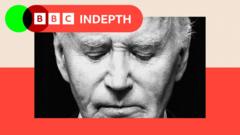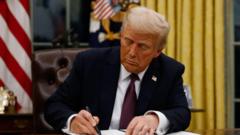*As Biden prepares to exit the White House, challenges from inflation to political infighting reveal a complex legacy and a fractured presidency.*
**Biden’s Presidency: A Tale of Missed Opportunities and Rising Challenges**

**Biden’s Presidency: A Tale of Missed Opportunities and Rising Challenges**
*Exploring the tumultuous journey of President Joe Biden as his term concludes amid infighting and political pressures.*
In a poignant moment last Thursday at Washington's National Cathedral, President Joe Biden stood before an audience of former presidents to eulogize the late Jimmy Carter. A one-term president like Carter himself, Biden's presence at this solemn event underscored deep reflections on his own time in office and the different trajectories of his predecessors, all of whom enjoyed the validation of re-election. "He saw well into the future," Biden remarked of Carter, highlighting a legacy that includes civil rights and environmental protection. However, as Biden awaits the transition of power back to Donald Trump next week, he faces scrutiny regarding his own achievements and failures.
In his last days in office, Biden made a case for a legacy built on economic recovery and international leadership, hoping history would view his presidency favorably. Yet, with approval ratings lingering near 39%, down from 57% at the start, public sentiment tells a different story. His efforts as President include orchestrating significant infrastructure legislation, bolstering NATO, and enhancing judicial diversity. Yet these accomplishments have struggled to shine amidst a backdrop of public dissatisfaction, poverty rates, and headlines marked by crises both at home and abroad.
Critics have pointed out the chaotic U.S. withdrawal from Afghanistan as a significant early misstep, leading to a rapid decline in approval ratings that never recovered. Rising inflation rates became another critical issue, initially dismissed by Biden and Treasury Secretary Janet Yellen as "transitory." Despite eventual declines in inflation, the narrative of an economic downturn prevailed in the minds of voters.
In addition to economic woes, Biden’s administration was slow to react to an influx of undocumented migration and faced challenges with Covid-related shortages and the repercussions of divisive social policies. The response to crises appeared disorganized, further eroding public confidence. Despite navigating legislative victories, including a substantial economic aid plan and infrastructure improvements, the success was marred by failures to communicate these wins effectively to the American voter.
As challenges mounted, Biden’s inner circle became increasingly insular, leaving them vulnerable to the impression of a government struggling under pressure. Voices from within indicated that fatigue from constant combat against a growing political opposition resulted in increasing infighting. While Biden was once perceived as a gifted orator, critics began to question his capacity to connect with the public, exacerbated by visible signs of aging.
Biden entered the 2024 election campaign aiming to combat the persistent perception that he was declining in capability. His campaign was marred by a series of miscommunications and moments of confusion, culminating in a debate performance that reinforced fears about his fitness for office. Simultaneous familial challenges, including his son Hunter's legal difficulties, added strain to an already tumultuous political landscape.
The tension culminated in what might be viewed as a critical moment in Biden’s presidential journey. With mounting pressure, he chose to step aside from the race, making way for a new chapter of Democratic leadership. As Trump prepares to reclaim the presidency, Biden's legacy will undoubtedly be judged against those turbulent times and his resistance to the challenges of his tenure.
The narrative of Biden’s presidency serves as a reminder of the complexities of political leadership in an age of division, where public perception often overshadows legislative accomplishments. What remains now is the work of historians to evaluate Biden's impact and influence amidst the political machinations that defined his leadership. As Trump prepares for a return to power, one must ponder whether Biden's presidency was a stepping stone to future progress or simply a bridge to the past.
In his last days in office, Biden made a case for a legacy built on economic recovery and international leadership, hoping history would view his presidency favorably. Yet, with approval ratings lingering near 39%, down from 57% at the start, public sentiment tells a different story. His efforts as President include orchestrating significant infrastructure legislation, bolstering NATO, and enhancing judicial diversity. Yet these accomplishments have struggled to shine amidst a backdrop of public dissatisfaction, poverty rates, and headlines marked by crises both at home and abroad.
Critics have pointed out the chaotic U.S. withdrawal from Afghanistan as a significant early misstep, leading to a rapid decline in approval ratings that never recovered. Rising inflation rates became another critical issue, initially dismissed by Biden and Treasury Secretary Janet Yellen as "transitory." Despite eventual declines in inflation, the narrative of an economic downturn prevailed in the minds of voters.
In addition to economic woes, Biden’s administration was slow to react to an influx of undocumented migration and faced challenges with Covid-related shortages and the repercussions of divisive social policies. The response to crises appeared disorganized, further eroding public confidence. Despite navigating legislative victories, including a substantial economic aid plan and infrastructure improvements, the success was marred by failures to communicate these wins effectively to the American voter.
As challenges mounted, Biden’s inner circle became increasingly insular, leaving them vulnerable to the impression of a government struggling under pressure. Voices from within indicated that fatigue from constant combat against a growing political opposition resulted in increasing infighting. While Biden was once perceived as a gifted orator, critics began to question his capacity to connect with the public, exacerbated by visible signs of aging.
Biden entered the 2024 election campaign aiming to combat the persistent perception that he was declining in capability. His campaign was marred by a series of miscommunications and moments of confusion, culminating in a debate performance that reinforced fears about his fitness for office. Simultaneous familial challenges, including his son Hunter's legal difficulties, added strain to an already tumultuous political landscape.
The tension culminated in what might be viewed as a critical moment in Biden’s presidential journey. With mounting pressure, he chose to step aside from the race, making way for a new chapter of Democratic leadership. As Trump prepares to reclaim the presidency, Biden's legacy will undoubtedly be judged against those turbulent times and his resistance to the challenges of his tenure.
The narrative of Biden’s presidency serves as a reminder of the complexities of political leadership in an age of division, where public perception often overshadows legislative accomplishments. What remains now is the work of historians to evaluate Biden's impact and influence amidst the political machinations that defined his leadership. As Trump prepares for a return to power, one must ponder whether Biden's presidency was a stepping stone to future progress or simply a bridge to the past.























